Wherefore to Dover?
Dover, Faversham and the 1597 tour
The coastal gateway features in a number of the William Shakespeare's plays so it's not a surprise that the company with which he was associated, The Lord Chamberlain’s Men, visited Dover in 1597. They were paid 13 shillings and 4 pence by the local corporation.
The civic records don’t tell us which play or plays the actors performed but their touring repertory may have included the Bard's latest works at the time: Romeo and Juliet, Richard II, King John, The Merchant of Venice and Henry IV Part I.
-
![]()
Much ado near me
Hear more Shakespeare stories on BBC Radio Kent
-
![]()
Shakespeare Festival 2016
The BBC celebrates the genius of the bard
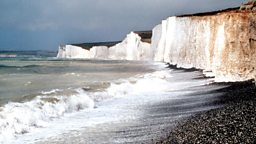
Dr Siobhan Keenan, Reader in Shakespeare and Renaissance Literature at De Montfort University, says: “In many communities it was customary for the so-called ‘mayor’s play’ to be opened up to local people, so the audience in Dover could have been large.”

A performance of King John would have flattered the local Dover audience. In the play there is an attempted invasion via Kent by the French Prince (Louis), but it is resisted only in Dover, and in Act V of King John we hear how “All Kent hath yielded..” (to the French Prince) “…but Dover castleDr Siobhan Keenan, De Montfort University
She adds: “A performance of King John would have flattered the local Dover audience. In the play there is an attempted invasion via Kent by the French Prince (Louis), but it is resisted only in Dover, and in Act V of King John we hear how “All Kent hath yielded..” (to the French Prince) “…but Dover castle”.
Shakespeare’s Company returned to Dover at least twice more in Shakespeare’s lifetime but as the newly named The King’s Men, being rewarded by the town in 1606 and 1610.
Again, the records don’t tell us what they performed but in 1606 the troupe’s new Shakespeare plays included All’s Well That Ends Well, King Lear, Macbeth, and Antony and Cleopatra; and in 1605 they are recorded as performing Henry V and The Merchant of Venice at court so there’s a chance that these were also in the touring repertory and would have been available for performance in Dover.
King Lear might have seemed an especially appropriate play for at least one of their performances in the town in 1606. Lear famously heads to Dover (in Act 3), accompanied by Edgar (in disguise as Poor Tom) after being spurned and turned out of doors by his older daughters, Goneril and Regan.
In 1610 the company’s new Shakespeare plays included Cymbeline and The Winter’s Tale but we also know that their touring repertory included Othello as there is a record of them performing this play in Oxford that year.
Playing Faversham
As part of the same tour, The Lord Chamberlain’s Men played at Faversham, probably performing at the town’s original Guildhall - which no longer survives – and were paid 13 shillings and 4 pence by the town, although records don't tell us which plays they performed.
Shakespeare’s Company returned to Faversham at least once during Shakespeare’s lifetime, visiting as the King’s Men in 1605-6 when they were paid £1 and are thought to have performed in the upper hall (over the arcaded market area) at the new Guildhall (or Court Hall) which survives to the present, although altered.
King Lear: Act 3, Scene 7
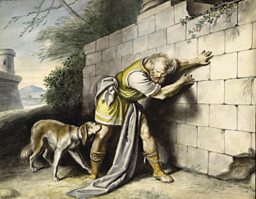
‘Wherefore to Dover…’ from King Lear
Act 3, Scene 7
CORNWALL: Where hast thou sent the king?
GLOUCESTER: To Dover.
REGAN: Wherefore to Dover? Wast thou not charged at peril--
CORNWALL: Wherefore to Dover? Let him first answer that.
GLOUCESTER: I am tied to the stake, and I must stand the course.
REGAN: Wherefore to Dover, sir?
GLOUCESTER: Because I would not see thy cruel nails
Pluck out his poor old eyes; nor thy fierce sister
In his anointed flesh stick boarish fangs.
The sea, with such a storm as his bare head
In hell-black night endured, would have buoy'd up,
And quench'd the stelled fires:
Yet, poor old heart, he holp the heavens to rain.
If wolves had at thy gate howl'd that stern time,
Thou shouldst have said 'Good porter, turn the key',
All cruels else subscribed: but I shall see
The winged vengeance overtake such children.
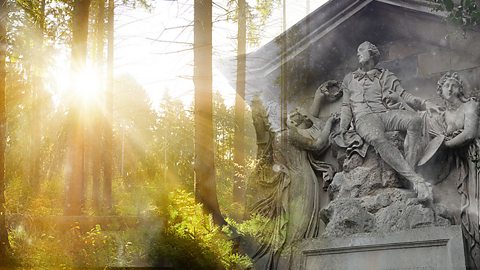
The Lord Chamberlain's Men In Dover
Hear more about the company's tour in 1597
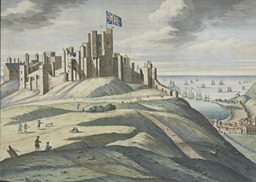
Shakespeare on Tour
From the moment they were written through to the present day, Shakespeare’s plays have continued to enthral and inspire audiences. They’ve been performed in venues big and small – including inns, private houses and emerging provincial theatres.

BBC English Regions is building a digital picture which tracks some of the many iconic moments across the country as we follow the ‘explosion’ in the performance of The Bard’s plays, from his own lifetime to recent times.
Drawing on fascinating new research from Records of Early English Drama (REED), plus the British Library's extensive collection of playbills, as well as expertise from De Montfort University and the Arts and Humanities Research Council, Shakespeare on Tour is a unique timeline of iconic moments of those performances, starting with his own troupe of actors, to highlights from more recent times. Listen out for stories on Shakespeare’s legacy on your BBC Local Radio station from Monday 21 March, 2016.
You never know - you might find evidence of Shakespeare’s footsteps close to home…
Craig Henderson, BBC English Regions
A scene from King John
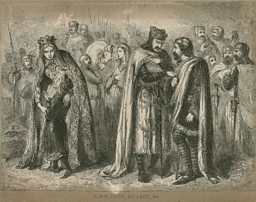
1597 – A lively year for theatre in London
The year 1597 was an interesting and sometimes turbulent year for anyone for whom the theatre was their main source of income.
At one point the government of the day closed down all theatres in London, something which academics believe was caused by the authorities being concerned about large crowds gathering in public places.
It was the same year in which in Ben Jonson’s controversial satire The Isle of Dogs also caused a huge row with the authorities, (although it’s not believed to have been the cause of the theatre ban in itself).
Shakespeare’s Players, performing at this time as The Lord Chamberlain’s Men, hit the road to go on tour.
There may have been several reasons for this – it may have been more of a holiday for them, especially if they only had to perform two plays rather than eight in a week in London!
In the summer of 1597 we see The Lord Chamberlain’s Men embark on an extensive tour of around several hundred miles across the South East and parts of the West Country. In around 11 weeks they take in at least six towns, visiting Faversham, Rye, Dover, Bristol, Bath and Marlborough along the way.
It is through the documents from local town halls and other performing venues - collated by the Records of Early English Drama project - where we see the route and details of this tour emerging.
It must have been a gruelling trip, undertaken almost entirely on foot although they may well have had a horse and possibly a cart to carry their equipment and belongings.
At this time, Shakespeare’s latest plays would have included Romeo and Juliet, Richard II, King John, The Merchant of Venice and I Henry IV, and it was those outside of London who were about to benefit.
-
![]()
Shakespeare Lives
The nation’s greatest performing arts institutions mark 400 years since the Bard's death
Related Links
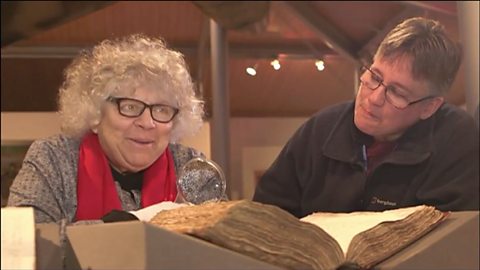
Miriam Margolyes in Dover
Watch the actress discuss the importance of the Bard
Shakespeare on Tour: Around Kent
-
![]()
Touring Kent to avoid the plague in London
Shakespeare's Lord Strange’s Men perform in Kent
-
![]()
A rare example of a surviving Shakespearean venue
Likely to have staged a Shakespeare play during the dramatist’s own lifetime
-
![]()
Small towns big on Shakespeare
How Shakespeare's company visited the smallest towns
-
![]()
Mrs Hamblin - A woman scorned
The tumultuous private life of a famous American actress
-
![]()
Sir Edward Dering – Proud owner of Shakespeare’s First Folio
And possibly the host of the first amateur performance of Shakespeare
-
![]()
Dover Theatre and Miss Davenport
'The juvenile actress of the day'
Shakespeare on Tour: Around the country
-
![]()
A wealthy host attracts Shakespeare's actors to Yorkshire
Shakespeare’s King’s Men visit the Clifford family at Londesborough Hall
-
![]()
Norwich gives Shakespeare's company the cold shoulder
Shakespeare's players paid 40 shillings not to perform
-
![]()
Celebrated young actor stars as Hamlet
Child prodigy actor who took theatres by storm in 1804 stars as Hamlet in Stafford
-
![]()
Much Ado about Dracula?
Much Ado About Nothing at the London Lyceum 1883













